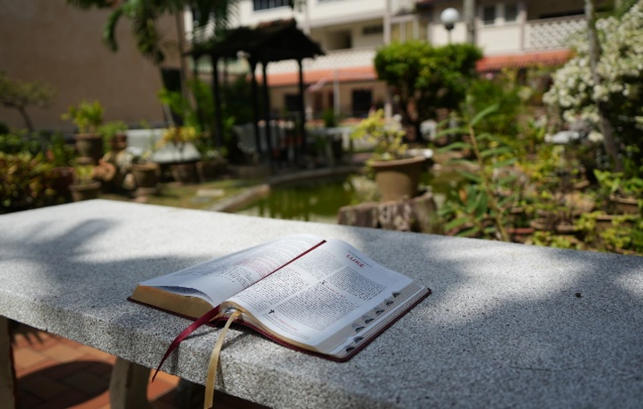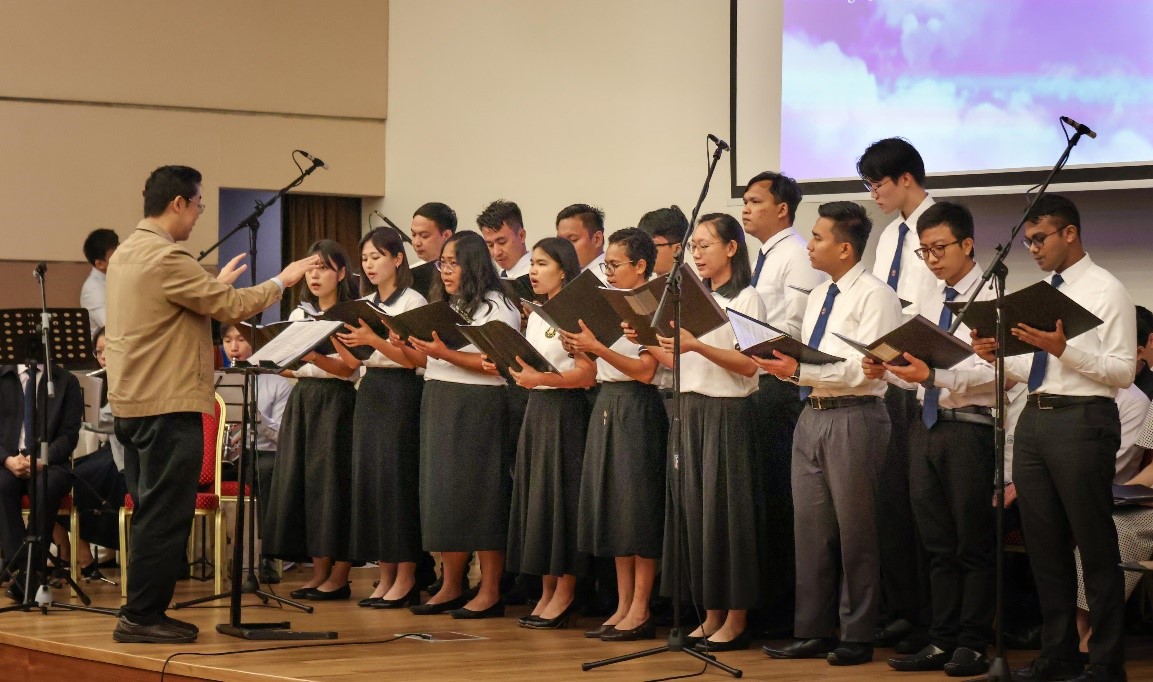MY SPIRITUAL GROWTH AT FEBC
Gouk Tae Hwan

First of all, I just want to thank the Lord for His faithfulness in bringing me through some of the toughest times during my time at FEBC and even during my National Service in Korea. Looking back, I’m honestly amazed at how God has carried me through it all.
Nothing without Him
When I first came to FEBC, I couldn’t speak or read a word of English. It was like being thrown into a completely foreign world. I remember feeling so lost, not understanding anything that my roommates or Mrs Ivy Tow were saying to me. All I could do was smile and nod, hoping I wasn’t making things awkward. I really don’t know how I survived that first year. It’s hard to explain, but one thing I know for sure is that it was only by God’s grace that I made it through. From the start to where I am now, I see how God has guided me every step of the way. I’m nothing without Him.
God Opened My Eyes
But it wasn’t just the language barrier I struggled with. I also faced a lot of challenges in my spiritual life. Before coming to FEBC, I thought I was doing okay. I had this idea that I was a happy, “good” Christian, but I didn’t take God’s Word seriously. I called myself a Christian, but my life didn’t reflect that. My behaviour often looked worse than those around me who weren’t Christians. I was pretending to be something I wasn’t.
Thankfully, God opened my eyes during my time at FEBC. The more I studied His Word, the more I realised just how much of a sinner I was. It was like I was the prodigal son, coming to terms with my true condition. All my flaws, my sins, my selfishness—everything started to surface as I read and studied the Bible. And while it was uncomfortable, it was also a wake-up call I desperately needed. I started to understand just how much I needed God. I can’t even get through a single day without His help.
My Need for God
Looking back, I see how much God has done in my life. Coming to FEBC wasn’t just about learning more about the Bible—it was about learning more about myself and my need for God. I’ve gone through a lot of spiritual growth here, but it’s been a humbling process. I’ve learned that I can’t rely on my own strength; I need God’s grace every single day. Without Him, I wouldn’t be where I am today.
Covenant Theology is the final class in my time at FEBC. To be honest, when the semester started, I hadn’t planned to take this course at all. My main focus was just to finish my thesis and head back home. But before the semester began, Dr Jeffrey Khoo suggested that I should enrol in this course. At first, I was a bit hesitant, but out of respect for him and his guidance, I decided to take his advice. I trusted that God had a purpose for me in taking this class and that He wanted me to learn something more through it. Looking back now, I can see that Dr Khoo’s encouragement was definitely something I needed, and I’m grateful I listened.
Need for Sound Theology
One of the things I remember most clearly from Dr Khoo’s teaching, especially in the final class, was when he said, “When you’re in ministry and counselling, you shouldn’t base your advice on your own thinking or feelings, but on sound theology.” That statement really stuck with me. It’s easy to get caught up in personal emotions or opinions, but in ministry, we can’t afford to rely on those. We need to be grounded in solid, biblical truth and sound doctrines. Sadly though, it’s not always like that in the world today. So many people, especially in the church, want to hear what they want to hear, not necessarily what is true or what is biblically sound. It’s something I’ve noticed a lot, especially in the sermons I’ve heard in Korean churches. Sometimes, the messages that are preached just aren’t rooted in Scripture or sound doctrine. Instead, the focus is on telling people what they want to hear, what feels good, rather than challenging them with the truth of God’s Word. And that is really sad. Those who sit in the pews think they’re hearing the truth, but in reality, they’re just hearing things that make them feel better. It’s easy to get wrapped up in that because it’s more comfortable, but I think it ultimately leads to a lack of true spiritual growth.
When I think about this, I feel really grateful for the education I’ve received here at FEBC. God has truly blessed me with the opportunity to learn not just head knowledge, but heart knowledge. It’s one thing to understand theology intellectually, but it’s another to have it sink deep into your heart and life. Over the years, I’ve come to realise how important it is to have a solid foundation in sound doctrine, not only for personal growth but also for how I serve others. Without that, I wouldn’t be able to minister properly or counsel people biblically.
God’s Word Is Absolutely Foundational
I would like to take a moment to talk about one of the most crucial doctrines in Christianity: the doctrine of Verbal Plenary Preservation (VPP). In my view, this is absolutely foundational to our faith, and it’s something that every Christian should understand clearly. As believers, we need to know what we believe, and it’s vital to recognise that what we believe isn’t just based on human philosophy or theories about how to make life better in the world. What we believe is the truth—the Word of God, the Word from God, the Word of life.
I think it’s important to stress that the Bible, as the Word of God, is perfect and without any single error. The world might claim that the Bible contains mistakes or contradictions, but that’s understandable since the world doesn’t know who God is or understand what the Bible truly is. But what’s really troubling to me is when some Christians, people who claim to believe in God, believe in His Word, and believe in the Holy Scriptures, also say that the Bible has errors or mistakes. How can they say that? It’s deeply concerning to me.
When I think about this, I can’t help but feel saddened. If you truly believe that the Bible is the Word of God, how can you claim it has faults or flaws? The Bible is perfect: it is pure, perfect, and without error from beginning to end. I was reminded of this truth through one of the verses I studied in this course—Psalm 12:6-7: “The words of the LORD are pure words: as silver tried in a furnace of earth, purified seven times. Thou shalt keep them, O LORD, thou shalt preserve them from this generation for ever.” To me, these verses are incredibly powerful. They’re a direct promise from God that His Word will be preserved forever, without error, from generation to generation.
It’s not just a human effort to protect the Bible, but God Himself promises to preserve and keep His Word. That means every word, every verse, and every truth within the Scriptures is exactly as God intended it to be. It’s not something we can simply pick and choose or twist to suit our preferences—it is God’s very Word, faithfully preserved throughout history. This is such a critical point because, if we lose confidence in the absolute truth and reliability of the Bible, we lose the foundation of our faith.
I would like to take the Dean Burgon Oath which states: “The Bible is none other than the voice of Him that sitteth upon the Throne! Every Book of it, every chapter of it, every verse of it, every word of it, every syllable of it, every letter of it, is the direct utterance of the Most High! The Bible is none other than the Word of God: not some part of it more, some part of it less; but all alike, the utterance of Him who sitteth upon the Throne; faultless, unerring, supreme!”
This is why the doctrine of VPP is so important. It teaches us that not only is God’s Word inspired (God-breathed) but also that it has been carefully preserved by God throughout history, down to the very words. It’s a doctrine that gives us confidence and assurance that when we read the Bible, we are reading what God has spoken, not some version that has been corrupted or distorted over time.
I’m really grateful for the opportunity to have learned more about this truth in this course. It has reminded me of how essential it is for us as Christians to have a solid understanding of what we believe and why we believe it. If we don’t have this foundational understanding, we can easily be swayed by doubts or false teachings. But the truth is, God has promised to preserve His Word. From the first page to the last, His Word stands the test of time, and it is pure, true, and faithful.
So, when people claim that the Bible has mistakes, we can stand firm and say, “No, the Bible is true. God has promised to keep His Word forever.” I think it’s crucial that as believers, we hold onto that truth and never let go of our conviction that the Bible is the perfect, preserved Word of God, and there’s nothing that can shake that. That’s why this course on Covenant Theology has been so important for me. It’s not just about learning abstract concepts or theology for the sake of knowledge—it’s about understanding how these truths apply to life, to ministry, and to the way we live as Christians. It’s about building a strong, biblical framework that can shape everything we do. And that’s what I feel I’ve been given here at FEBC. I’ve been equipped not only with the tools for understanding God’s Word but also the heart to apply it in a way that honours Him.
I’ve Learned So Much
I really thank the Lord that He has allowed me to be part of this community of believers, where sound doctrine is emphasised, and where the Word of God is held in such high regard. It’s something I don’t take for granted. I’ve learned so much, and I know that the impact of this education will stay with me long after I leave FEBC. It’s been a journey of not only gaining knowledge but also growing in wisdom and understanding of God’s truth. And for that, I am deeply thankful.
[Gouk Tae Hwan completed his studies at FEBC last semester and will be conferred the Bachelor of Religious Education this May (DV).]

FEBC Choir @ True Life Bible-Presbyterian Church


